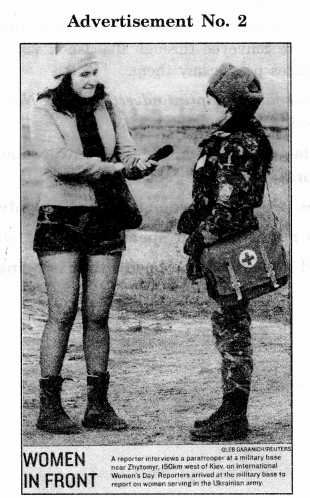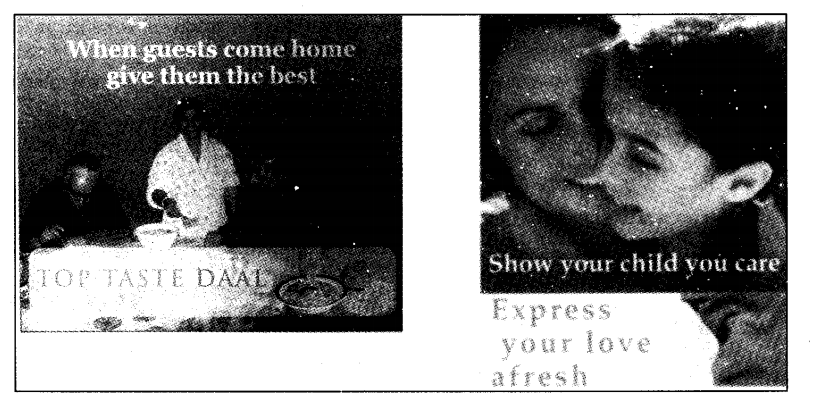NCERT Solutions for Class 7 Social Science Civics Chapter 7 Understanding Advertising are part of NCERT Solutions for Class 7 Social Science. Here we have given NCERT Solutions for Class 7 Social Science Civics Chapter 7 Understanding Advertising.
| Board | CBSE |
| Textbook | NCERT |
| Class | Class 7 |
| Subject | Social Science Civics |
| Chapter | Chapter 7 |
| Chapter Name | Understanding Advertising |
| Number of Questions Solved | 12 |
| Category | NCERT Solutions |
NCERT Solutions for Class 7 Social Science Civics Chapter 7 Understanding Advertising
NCERT TEXTBOOK EXERCISES
Question 1.
What do you understand by the word ‘brand’? List two reasons why building brands is central to advertising?
Answer.
1. The word ‘brand’ is the particular name or sign given to a product made by a manufacturer. The brand is made to differentiate a particular product from others in the market.
2. Advertising is the only means through which a brand can be popularised fastest and can reach the largest number of people. It is the advertising which influences people’s thought regarding a particular brand of product. These are the reasons why building a brand is central to advertising.
Question 2.
Choose two of your favourite print advertisements. Now, look at each of these and answer the following questions:
(a) What visuals and text are being used in these advertisements to attract my attention?
(b) What values are being promoted in these advertisements?
(c) Who is this advertisement speaking to and who is it leaving out?
(d) If you could not afford the brand that is being advertised how would you feel? ‘


Answer.
| Advertisement No. 1 | Advertisement No. 2 |
| 1. The visuals and text used in this advertisement are the assurance at your doorstep about the weight of the LPG cylinder. | 1. The visuals and text used in this advertisement are “Women in Front” on World Women Day, 8th March 2007. |
2. This advertisement highlights the values that people should weigh the LPG cylinder before obtaining it from the delivery men. | 2. The values in this advertisement are women are accepting dangerous and strenuous work in Today’s world. |
3. This advertisement is speaking to the consumers of LPG gas of Indane company and it is leaving out non-consumers of the gas. | 3. This advertisement is speaking to the people at large about the women of today. It is leaving out those who do not relish seeing women in front. |
4. If we could not afford the brand that is being advertised we would feel disgusted.
|
Question 3.
Can you explain two ways in which you think advertising affects issues of equality in a democracy?
Answer.
(1) Advertising for different products/ brands reaches only those people who have the means of media either print or electronic. But those, mainly poors, who don’t have these means, are not able to know about these products. Thus, equality between the rich and poors in a democracy is affected here. Because in a democracy all have the right to information.
(2) Advertising is focusing on only the lives of the rich and leaving the issues of poverty, discrimination, and dignity aside. The issues avoided here are central to the functioning of equality in democracy.
Question 4.
Making an advertisement requires a lot of creativity. Let us imagine a situation in which a manufacturer has just made a new watch. She says that she wants to sell this watch to school children. She comes to your class and asks you all to create a brand name as well as an advertisement for the watch. Divide the class into small groups and each group creates an advertisement for this watch. Share it with the class.
Answer.
Do this exercise yourself with the help of your subject teacher.
INTEXT QUESTIONS
Question 1.
( Look at the two advertisements (See Figure in NCERT Textbook on Page 81) and fill the table. (NCERT Page 81)

| Top Taste Daal | Care Soap | |
| What are the advertisements selling? | ||
| How do they describe the product? | ||
| What is the text trying to say? | Guests should be served this. | |
| What do the pictures convey? | Love of a mother. | |
| Would you want to buy these products after seeing the advertisement? |
Answer.
| Top Taste Daal | Care Soap | |
| What are the advertisements selling? | Daal | Soap |
| How do they describe the product? | Give best to the guest in the form of Top Taste Daal | Loving mothers use care soap |
| What is the text trying to say? | Top Taste Daal is best | Care soap gives the best care |
| What do the pictures convey? | Good Hospitality | Mother’s love |
| Would you want to buy the products after seeing the advertisement? | Yes | Yes |
Question 2.
Do you think there is a problem in using the image of the mother as the only person who takes care of the child in the Care Soap advertisement? (NCERT Page 81)
Answer.
- Yes, it is assumed in our society that only mothers take care of their children and not fathers. Now the situation is changing.
- Females attract people more than males in advertisements.
Question 3.
What does this advertisement want me to feel when I use this brand? (NCERT Page 84)
Answer.
This ad wants mothers to feel that they care for their children’s health.
Question 4.
Who is this advertisement talking to and who is it leaving out? (NCERT Page 84)
Answer.
This ad is talking to the mothers and it is leaving fathers out.
Question 5.
If you have money to buy these products, how would you feel when you see these advertisements? If you do not have money, then how would you feel? (NCERT Page 84)
Answer.
- In the first situation, we would buy them instantly.
- In another situation, we would feel that we are not caring for our child well.
Question 6.
Who do you think is the target audience for the social advertisements below? (See figure in NCERT textbook on page 88) (NCERT Page 88)
Answer.
Society in general.
Question 7.
What is the message that each social advertisement is trying to get across? (NCERT Page 88)
Answer.
- Freedom is the birth-right of disabled children too.
- Disabled children have the right to education.
- Railways run faster than us. This means we should not cross the railway crossing when the train is coming.
Question 8.
Having read about the diarrhea epidemic in the chapter on State Government, can you make a social advertisement on what precautionary steps should be taken to prevent diarrhea? (NCERT Page 88)
Answer.
Tips:
- Advertisements on cleanliness, sanitation, a sprinkling of disinfectants.
- Guidance and counseling.
- To be done by the students themselves.
We hope the NCERT Solutions for Class 7 Social Science Civics Chapter 7 Understanding Advertising help you. If you have any query regarding NCERT Solutions for Class 7 Social Science Civics Chapter 7 Understanding Advertising, drop a comment below and we will get back to you at the earliest.